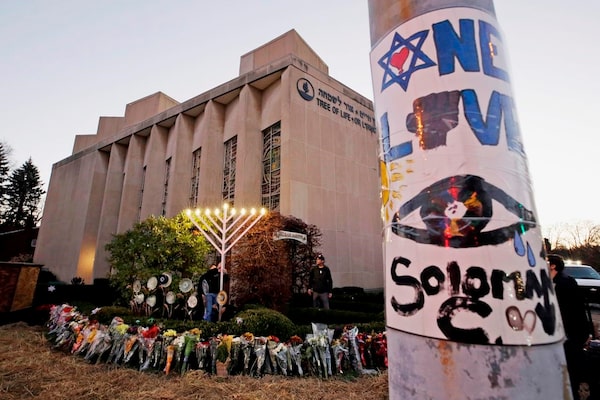
A menorah at a memorial outside the Tree of Life Synagogue, where Robert Bowers killed worshippers in a shooting on Oct. 27. 2018.The Associated Press
When Payton Gendron, the white supremacist who killed 10 people in a mass shooting at Tops Friendly Market on this city’s East Side was sentenced to life in prison here this week, Buffalo’s Black community experienced a trauma rebound.
The scene in Erie County Court – the latest development in a tragedy that began last May and led to a 27-count indictment and a guilty plea – was laced with emotion. A man rushed in anger at the convicted murderer. Anguished cries filled the chamber. A woman confronted the shooter, crying, “You killed my sister.” And it was clear that while Mr. Gendron had received his punishment, the mayhem and death that he, at the age of 18, had perpetrated continues to echo through the city. The wound still weeps, and so do the families and friends of the victims.
“This week is incredibly emotional and this will all come back,” said Steve Stoute, the first Black president of Canisius College, located within blocks of the Tops market. “We don’t know the half of how it affects the community.”
Buffalo is not alone in the sad dirge of American mass shootings. Ten of the deadliest 15 mass shootings in the country’s history have occurred in the 21st century, including the top five, which alone account for a cumulative 192 deaths and 972 injuries.
And in a week when this city relived its terror – and when two men were shot outside synagogues in the Pico-Robertson neighbourhood in Los Angeles – the Jewish community of Pittsburgh began a countdown to the trial of the man who in 2018 killed 11 at prayer at the Tree of Life synagogue in the city’s Squirrel Hill neighbourhood, the deadliest antisemitic attack in American history.
Community leaders, clergy members, and even the city police department and the FBI have sought to take lessons from other communities where the sounds of gunfire have ceased but the echoes remain.
“We are resources for each other,” Rabbi Jeffrey Myers, who was conducting Saturday morning services when the shooting began, said in an interview. “We have to pray we can do at least a reasonably good job while being mindful that there’s still going to be a lot of traumatized individuals and a lot of hurt around this.”
Gun violence in America, told through seven charts
There have been repeated contacts among Mr. Myers and his congregants and Pastor Eric Manning and the parishioners of Emanuel African Methodist Episcopal Church in South Carolina, where in 2015 nine members of a Bible study class were killed. Mr. Manning has visited Pittsburgh twice, and spoke at the funeral of Rose Mallinger, one of the Tree of Life victims. Members of the Pittsburgh congregation have visited the Charleston church.
The trauma ricochet will be especially evident in Squirrel Hill, considered the centre of Jewish life in Pittsburgh.
“Since its settlement about 100 years ago exactly, Squirrel Hill has emerged as one of the most durable, stable Jewish neighbourhoods in American history,” said Mark Oppenheimer, whose book titled Squirrel Hill: The Tree of Life Synagogue Shooting and the Soul of a Neighborhood was published in 2021.
“It’s had a sizable Jewish minority for a century now, which makes it difference from, say, New York’s Lower East side or Manhattan – where a very large Jewish population has shrunk – or a place like Scarsdale, N.Y., a famous Jewish community that didn’t become substantively Jewish until after World War II.”
The process of girding for a trauma boomerang – experienced in cities from coast to coast, and from Orlando (49 dead in the Pulse nightclub) to Newtown, Conn. (27 killed at Sandy Hook Elementary School) – is being led by a group called the 10.27 Healing Partnership, its name reflecting the October date in 2018 when the Pittsburgh massacre occurred. Founded four years ago to foster community resilience, the group offers trauma workshops, counselling, “healing circles” and “wellness Wednesdays” – a continuing effort and part of the run-up to this spring’s court sessions.
“We can recognize that we still carry the scars,” said Maggie Feinstein, director of the partnership. “But we can predict what might upset us the most and prepare ourselves by building up coping mechanisms and choosing how we engage.”
One of the elements of the effort is a set of two seminars – the first occurred this week – on legal procedures designed to prepare Pittsburgh residents for the trial that is to begin April 24.
“This is going to be a very long and complicated trial and it will feature – it has to include – the testimony of the people who were there and the people who lost people there,” said David Harris, a Squirrel Hill resident, a University of Pittsburgh law professor and the father of Rabbi Alicia Harris of Congregation Shir Tikvah in Troy, Mich. “The individuals will have to relive it in court and the rest of us will have to hear about it and relive it.”
Just as the Buffalo shooting marked Black people around the country, the Pittsburgh shooting left scars on the Jewish community nationwide.
“The first principle in Jewish life is that we are all responsible for one another,” said Steven Grossman, former president of the American Israel Public Affairs Committee. “It is also a principle that when Jews are attacked we all feel vulnerable, which is why this trial is one that affects us all.”
 David Shribman
David Shribman